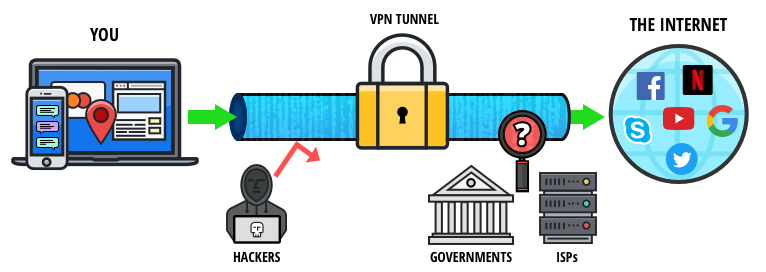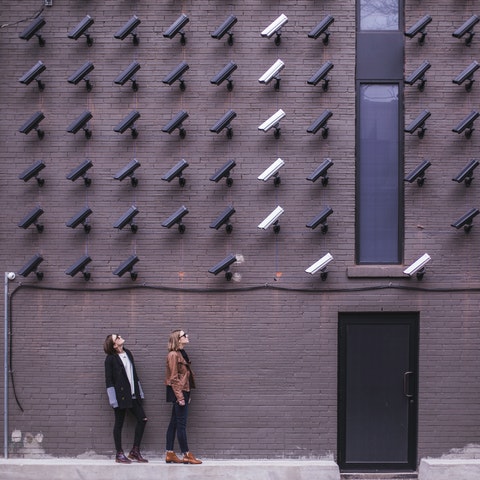Cyberspace Spiral
VPN
What is VPN ?
A VPN is a service that allows you to access the web securely and privately by encrypting and routing connection via a server and hiding your online activity.
 With a VPN, or a Virtual Private Network, you can connect to another computer through a secure "tunnel".
Normally, when you are visiting any website, it’s like asking your ISP (your internet provider) to send a
box of data to the destination. The ISP delivers your box to the website’s door and tells them "User X has
sent you this." It then collects another box from the site back to you. You proceed to open the box,
without knowing if the ISP have checked the box content during the transportation. When you use a VPN, the
VPN provider first sends you a key. Now each time you visit a website, lets call it "Z", instead of sending
a box, you will send a chest. It will be locked with the said key. Furthermore, the destination will be the
VPN server instead of website Z. The ISP will then deliver your locked chest to the VPN server and tell
them "User X sent you this". The VPN provider receives your chest, unlocks it with a copy of the key they
sent you earlier and forwards whatever is inside to the destination (website Z). They then fetch another
box from website Z, put it into a chest, lock the chest and then ask the ISP to send it back to you. You
unlock the chest with the key from the very beginning. Notice that in the second case, since the only
parties with the key here are you and your VPN provider, the ISP won't be able to open your chest during
transportation. They won't even know that your final destination is website Z, since it was the VPN
provider who delivered your chest to the destination. For all they know, you sent them a locked chest to
the VPN server then received another locked chest back from there. Moreover, the guys and girls at the
destination, website Z, will think it was the VPN server’s guys and girls who sent them the chest. They
have no idea the original sender was you.
With a VPN, or a Virtual Private Network, you can connect to another computer through a secure "tunnel".
Normally, when you are visiting any website, it’s like asking your ISP (your internet provider) to send a
box of data to the destination. The ISP delivers your box to the website’s door and tells them "User X has
sent you this." It then collects another box from the site back to you. You proceed to open the box,
without knowing if the ISP have checked the box content during the transportation. When you use a VPN, the
VPN provider first sends you a key. Now each time you visit a website, lets call it "Z", instead of sending
a box, you will send a chest. It will be locked with the said key. Furthermore, the destination will be the
VPN server instead of website Z. The ISP will then deliver your locked chest to the VPN server and tell
them "User X sent you this". The VPN provider receives your chest, unlocks it with a copy of the key they
sent you earlier and forwards whatever is inside to the destination (website Z). They then fetch another
box from website Z, put it into a chest, lock the chest and then ask the ISP to send it back to you. You
unlock the chest with the key from the very beginning. Notice that in the second case, since the only
parties with the key here are you and your VPN provider, the ISP won't be able to open your chest during
transportation. They won't even know that your final destination is website Z, since it was the VPN
provider who delivered your chest to the destination. For all they know, you sent them a locked chest to
the VPN server then received another locked chest back from there. Moreover, the guys and girls at the
destination, website Z, will think it was the VPN server’s guys and girls who sent them the chest. They
have no idea the original sender was you.
Why use VPN?
- Online anonymity
- Online safety when connecting to public WiFi hotspots
- Unrestricted access to the Internet content
- Bypass censorship and geolocation restrictions
- Overall privacy. Prevent your Internet Service Provider (ISP), third parties, network admins or governments from spying on your online activity
- Save money on flights and other online purchases by changing your IP address
VPN can be particularly useful for political activists, journalists, and bloggers who live and work in countries under authoritarian regimes or just regular people trying to access, consume or create digital content without restrictions or threats.
Is VPN legal?
In countries with restrictive Internet regulations (Russia, China, Iran, Turkey, etc.), or in countries with wide surveillance abilities (USA, UK, France, Israel etc.), state surveillance agencies typically are legally allowed to coerce either the VPN provider, or the server provider of the VPN provider, to assist with such network monitoring. VPNs are legal in most parts of the world. A quick test you can do to determine if a VPN is legal in some particular country is to look at its governing body. If the country is countrolled by an authoritarian government which heavily relies on online surveillance or censorship, then it’s likely that a VPN is illegal there. Countries in which VPN usage is restricted or illegal are:
- China
- Russia
- Belarus
- Turkey
- Turkmenistan
- North Korea
- Iraq
- Iran
- Egypt
- United Arab Emirates
- Oman

Penalties differ from country to country, so in case you travel or live in one of these countries, please make additional research before using a VPN.
Another thing to be aware of when choosing a VPN provider is that their company shouldn’t be registered in one of the "Fourteen eyes" countries, members of which collect and share your data.Free VPN vs Paid VPN
Running a good VPN service costs a lot of money — stable servers, data transfer, infrastructure, employees, and so on. And since nothing is really free in this world, when you choose to use a free VPN, there is a very high possibility that the product is… you. Simply put, it's possibile that free VPN providers could be selling your data. And because we care about privacy here, we strongly urge against using free VPNs.
Things to look out for when searching for a new paid VPN provider:
- Do they keep logs?
- The jurisdiction under which the VPN is established
- Privacy features
- Do they support P2P/torrents?
- Speed
- How many servers they have and in which countries those servers are located
- For how long they have been around?
- Price and Payment Methods
- Netflix access
- IP / DNS / WebRTC leak protection
- VPN app’s usability
Suggested Providers
In case you find interest in trying how a VPN works yourself or would like to learn more about additional features a VPN can offer, feel free to carry on with your reasearch. We went through over 30 well known VPN providers based on the criteria above. What we found that NordVPN and ExpressVPN are the leaders of the industry. Both of them are easy to use, secure and affordable. Meanwhile ProtonVPN can't offer as many different server locations as the other two, yet if what you’re looking for is optimal transparency, privacy and accountability, you should definitely consider them as well.
NordVPN |
ProtonVPN |
ExpressVPN |
|---|---|---|
| 5000+ Servers · 62 Countries | 340+ Servers · 31 Countries | 2000+ Servers · 94 Countries |
| Based in Panama | Based in Switzerland | Based in British Virgin Islands |
| 2.99 /mo* | 4 /mo* | 6.67 /mo* |
| No Logging Policy | No Logging Policy | No Logging Policy |
| Torrenting/P2P - Netflix Friendly | Torrenting/P2P - Netflix Friendly | Torrenting/P2P - Netflix Friendly |
| 30-day money back guarantee | 30-day money back guarantee | 30-day money back guarantee |
| Crypto Accepted | Free Option | Crypto Accepted |


